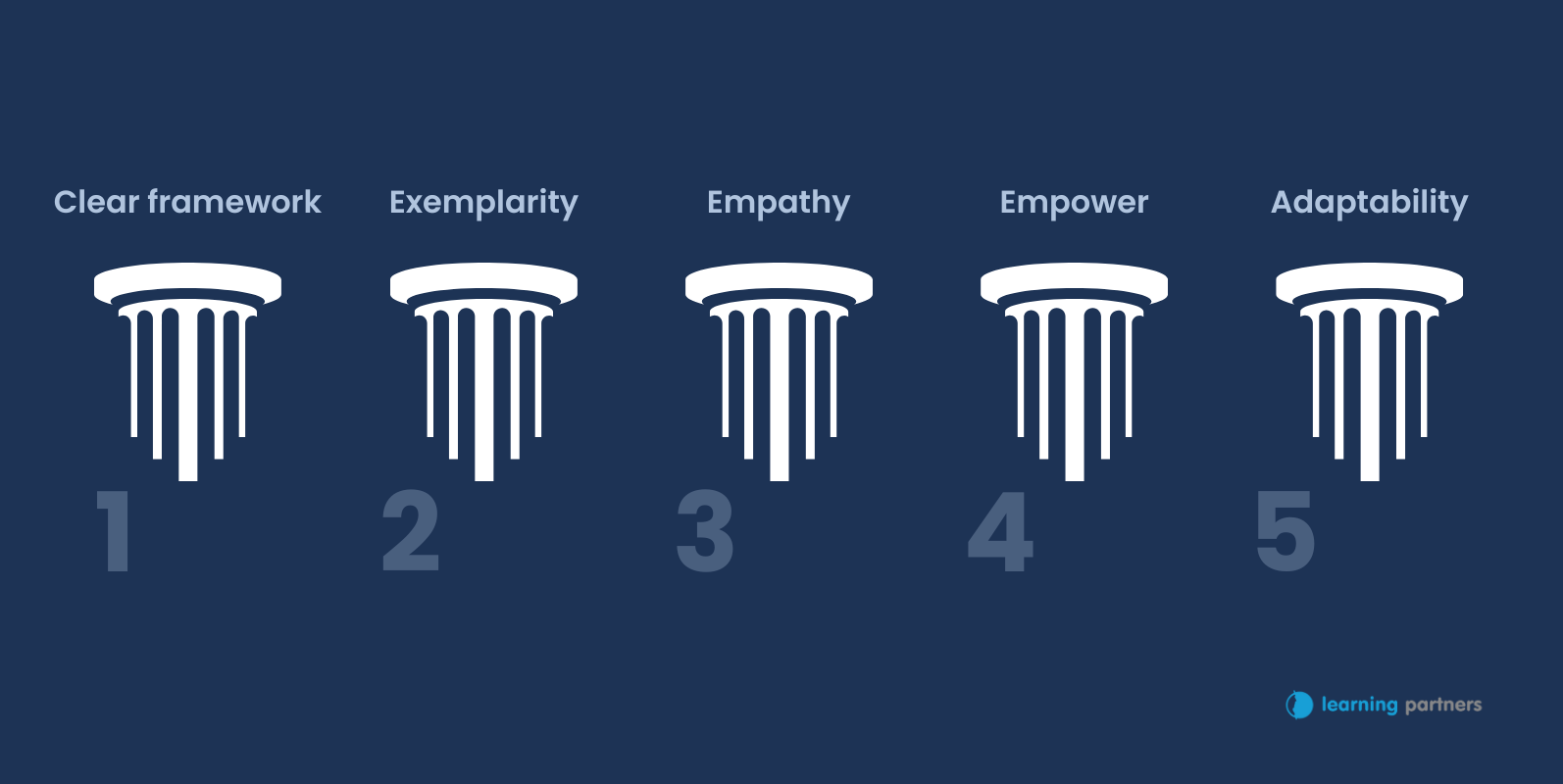Managerial posture definition: In a constantly changing professional world, the managerial function has never been so demanding. Organizations, both public and private, expect their managers to combine performance, leadership and benevolence. Faced with these expectations, the concept of managerial posture is becoming central. .
But what does it really mean? What’s at stake, and above all, how can you adopt an effective and sustainable posture in a complex professional environment?
In this article, Learning Partners offers you a clear definition of the managerial posture, highlights its challenges and provides methodological keys for developing it.
Welcome to Learning Partners, strategist in relational and managerial impact!
Our mission is to help senior managers improve the performance of their teams.
We work on 3 fundamental pillars: developing leadership and managerial skills, optimizing cohesion and performance, and recruiting and developing talent.
Contents
Defining the managerial posture
Why managerial posture is a key lever
The 5 pillarsof an effective managerial posture
How to develop a solid managerial posture? Methods and training
Examples of managerial postures in different contexts
The managerial posture, the foundation of sustainable leadership
Defining managerial posture: much more than a management style
Managerial posture refers to the way in which a manager embodies his or her role on a daily basis. Unlike a simple management style, it reflects an attitude, values and the ability to create meaning for teams.
What is the managerial posture?
Managerial posture refers to the overall attitude of a manager in his or her way of being, communicating, making decisions and managing teams. It integrates both the soft skillsand relational behavior and thealignment between personal values and professional practices. Unlike a management style, which can vary according to the situation (directive, participative, cross-functional…), posture is a stable, coherent foundation of identity that profoundly influences the way you lead a team.
A posture at the crossroads of know-how and interpersonal skills
Adopting a relevant managerial posture implies developing a strong sense of self-awareness. This involves emotional intelligenceemotional active listening skills, l’assertivenessIt also requires mastery of management tools and techniques. It’s not just a question of knowing how to delegate or set objectives, but of embodying a certain way of being that inspires, mobilizes and empowers.
Posture vs. different management styles
Where management styles are adaptive and situational, the posture is rooted in the managerial identity. For example, a manager may practice participative management while maintaining a posture of exemplarity, accountability and benevolence. Posture serves as a compass in different contexts.
Why is managerial posture a key lever for today’s managers?
New challenges for managers in French-speaking Switzerland
French-speaking Switzerland, like many other European regions, is witnessing the emergence of new challenges for managers: the integration of telecommuting, corporate social responsibility (CSR), heightened expectations for meaning at work, and multi-generational teams. Faced with these challenges, managerial attitudes need to evolve towards a more proactive approach . agility, the ability to listen, to mobilize and inspire.
Want to know more about strategic business agility? Take a look at our article on “How to implement strategic agility in business?”
Click here to read the article: How to implement strategic agility in business?
Impact on team motivation and performance
A clear, coherent and engaging managerial stance creates a climate of climate of trust within the team. This encourages motivation, l’autonomyand cohesion and, ultimately collective performance. A manager who knows how to lead with clarity and active listening encourages initiative and reduces psychosocial risks.
Posture, a vector for cohesion and commitment
A solid managerial posture is a powerful vector for federate. It gives meaning, structures roles and aligns practices with values. It is also a lever for collective intelligence It fosters the circulation of ideas, recognition and a sense of belonging.
The 5 pillars of an effective managerial posture
1. Clear framework
An effective manager knows how to set a clear framework Clarity: defining roles, responsibilities, ground rules and objectives. This clarity reassures employees and encourages their autonomy.
2. Exemplarity in everyday life
The managerial posture is based on consistency between actions and words. Managers are observed and imitated. He must therefore be a model of professionalism, rigor and ethics.
3. Listening and interpersonal skills
A good manager is a good listener. Active listeninglistening recognitionand conflict management and constructive feedback are essential interpersonal skills.
4. Empowerment
Delegation, empowerment and accountability are at the heart of a successful managerial approach. This implies trust, valuing skills and co-construction.
5. Adaptability and agility
In the face of the unexpected and change, the posture must be flexiblereactive, situational. This requires the ability to step back, analyze and adjust our practices.

How to develop a solid managerial posture? Methods and training
Continuous training: an essential lever
The management training enable you to acquire tools, but also to work in depth on your posture: role-playing, role-plays, co-development, individual support, coaching.
Knowing yourself to manage better
An effective managerial posture requires introspective work: what are my values? My beliefs? My relational automatisms? Tools like the 360° feedback, l’transactional analysis oremotional intelligence are useful.
Day-to-day management practice
This posture is also rooted in everyday life: benevolent reframing, steering objectives, leading meetings, conflict management, etc.etc. It’s essential to test, observe, regulate and progress continuously.
Examples of managerial postures in different business contexts
- Local manager A posture focused on listening, support, operations and day-to-day recognition.
- Cross-functional manager Cross-functional management: facilitating, coordinating, negotiating, in an environment with no direct hierarchical link.
- Sales manager : results-oriented posture, motivation, coaching in the field.
- Project management Project management: leadership, agility, change management, multi-stakeholder alignment.
Learning Partners can help you develop an effective and efficient management style!
At Leaning Partners, we advocate continuous training for company managers.
Make an appointment and let’s take your management skills to the next level!
The managerial posture, the foundation of sustainable leadership
The managerial posture can’t be improvised. It is built, reinforced and shaped over time, through experience, training and self-improvement. It is the foundation on which the manager’s technical, relational and strategic skills are built.
By cultivating a coherent, aligned and adaptable posture, the manager becomes a genuine transformation, cohesion and performance.. At Learning Partners, we guide managers and executives towards a strong, human and inspiring managerial posture.
Would you like to find out more? Discover our dedicated articles and our training courses to develop a sustainable and impactful managerial posture.
Phone
+41 22 510 25 15
+33 6 40 83 53 55
Address
68 Route du Stand,
VD1260 Nyon, Switzerland

